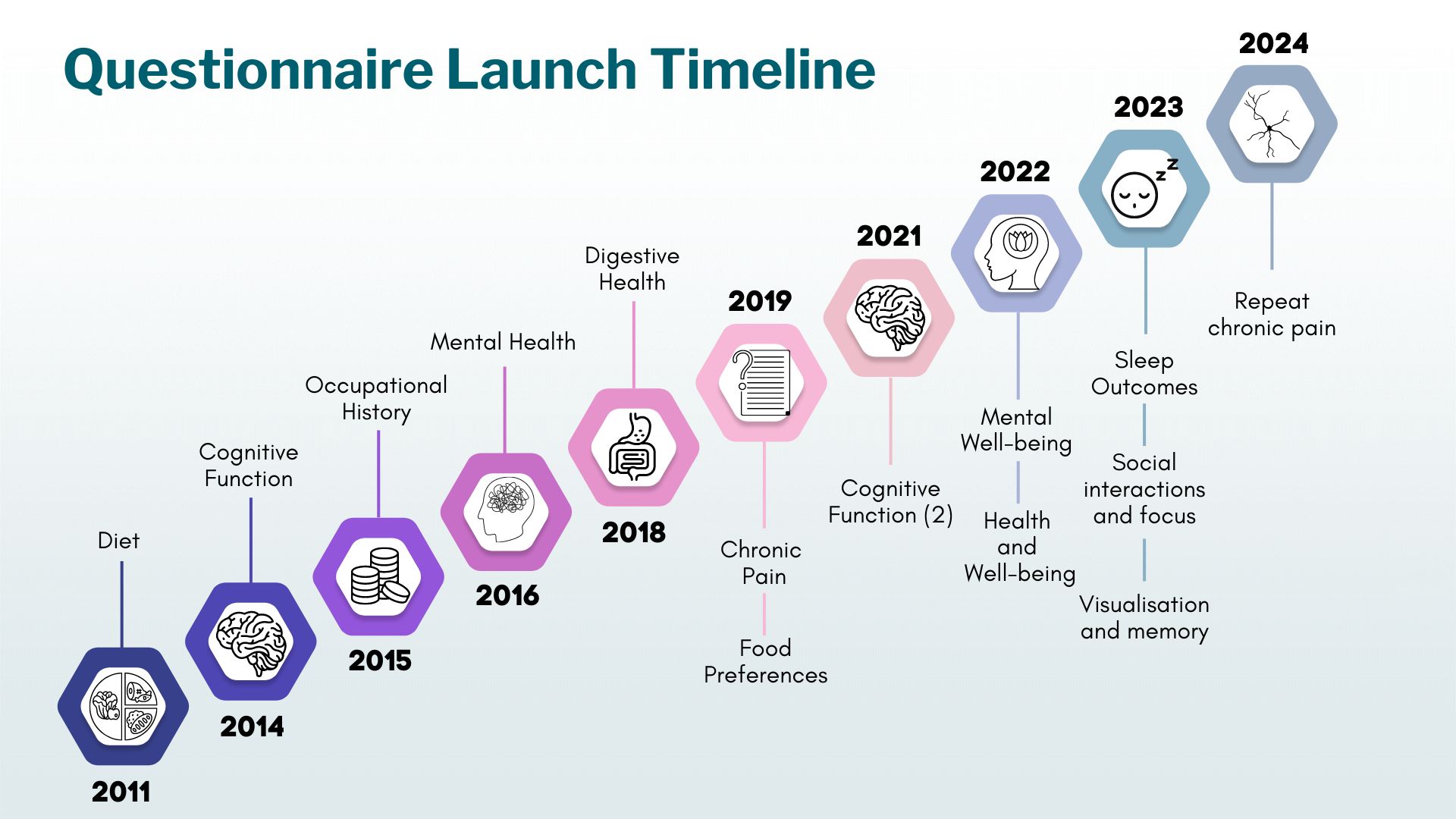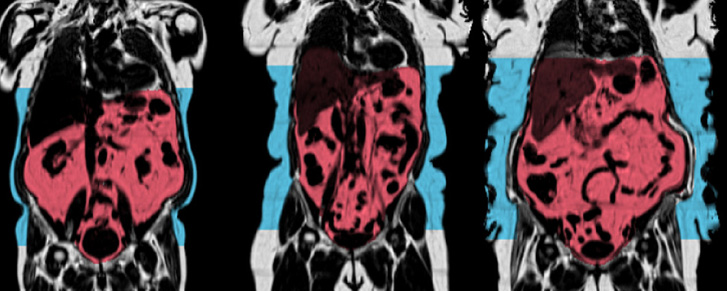Questionnaire data
Please note: data is only accessible through our Research Analysis Platform.
Adding extra layers of detail
We regularly send web-based questionnaires to around 330,000 participants for whom we have an email address. These are also available to participants without an email address via the participant website. These questionnaires aim to collect new or more detailed data for which longitudinal repeats are important or information on health outcomes that is not easily available via linkage to electronic health records, for example on chronic pain and mental health. We plan to release web-based questionnaires approximately twice a year, and you can find out more below. Please note that the content of all UK Biobank questionnaires has been developed with permission from original authors and should not be reproduced.

Diet questionnaire
- A 24 hour dietary recall questionnaire (Diet WebQ) which was circulated on 4 occasions.
- Collaborator: Professor Valerie Beral et al University of Oxford
Cognitive function
- A series of online puzzles and questions assessing cognitive function.
- Collaborator: UK Biobank cognitive neuroscience expert working group
Pain 2
-
A questionnaire to further develop our understanding of the types, duration, and severity of Chronic Pain in UK Biobank participants.
- Collaborator: Professor Danielle van der Windt, Keele University et al
Occupational History
- A detailed questionnaire assessing work history over the lifetime.
- Collaborator: Dr Lesley Rushton, Imperial College London
Mental Health
- A questionnaire to examine lifetime and current mental health.
- Collaborator: UK Biobank mental health outcomes expert working group

Digestive health
- A questionnaire to find out why some people develop digestive problems and others do not.
- Collaborator: Dr Miles Parkes, Addenbrookes Hospital, Cambridge et al.
Pain
- A questionnaire to find out more about the types, severity and duration of chronic pain in UK Biobank participants.
- Collaborator: Professor David Wynick, University of Bristol, et al.
Food preferences
- A questionnaire about biological and environmental factors that influence food preferences or lifestyle choices and their association with health.
- Collaborator: Dr Nicola Pirastu, University of Edinburgh, et al.
Mental well-being
- A questionnaire to find out more about various aspects of UK Biobank participants’ mental health and well-being, following up on the first UKB mental health questionnaire conducted in 2016.
- Collaborator: Professor Matthew Hotopf, King’s College London, et al.

Visualisation and memory
- A questionnaire about people’s differing capacities to recognise and recall faces, facts and events, and to form mental images.
- Collaborator: Associate Professor Nicky Whiffin, University of Oxford, et al.
Socialisation and focus
- A questionnaire to explore neurodiversity traits, including the way in which people interact with others, the quality of the relationships they develop and their capacity to focus their attention and control their impulsive behaviour.
- Collaborator: Professor Philip Asherson, King’s College London, et al.
Sleep outcomes
- A questionnaire to explore the sleep patterns and issues of UK Biobank participants, including sleep quality, insomnia and sleep disturbances.
- Collaborator: Professor Simon Kyle, University of Oxford, et al.
Future questionnaires
Topics for future questionnaires include:
- Repeat of chronic pain questionnaire
- Cognitive function

Related publications
Cognitive performance and functional outcomes of carriers of pathogenic copy number variants: analysis of the UK Biobank
Kimberley Kendall et. al.Ultra-processed food consumption and risk of obesity: a prospective cohort study of UK Biobank
Fernanda Rauber et. al.Hematological parameters and prevalence of anemia in white and British Indian vegetarians and nonvegetarians in the UK Biobank
Tammy Y N Tong et. al.Proposing a new web-based questionnaire
Email ukbiobank@ukbiobank.ac.uk if you would like to submit a proposal to collect new information via a web-based questionnaire.
Proposals should include the following:
- A strong scientific rationale for use in the UK Biobank population (e.g. giving consideration to the age range of the cohort, likely prevalence of the expected exposure/outcome you wish to measure; ability for prospective and repeated evaluation; examples of the range of research questions this measure will uniquely help to address, etc.)
- Published evidence of the validity and reliability of the measure in population-based research settings.
- A detailed specification of the content of the questionnaire and what is expected of the participant (e.g. time taken to complete questionnaire, special requirements or exclusions).
- Results from pilot data, if available.
The decision to implement these proposals is based on scientific merit and will be taken by UK Biobank. Please note that, should such proposals be approved, they will need to be scheduled in with our planned activities (outlined above).
Explore our data
Last updated






